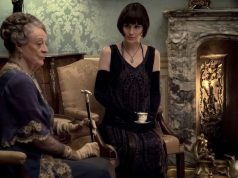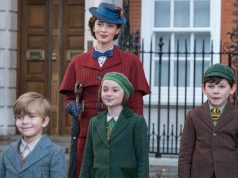If there was any question about whether I loved Colin Firth’s performance as Prince Albert, Duke of York in “The King’s Speech,” it dissolved when Albert’s speech therapist asked if he could call him “Bertie.” Here is a commoner — an Australian, even — suggesting he address His Royal Highness The Duke of York by a nickname fit for a drinking buddy. Firth’s reaction is priceless, as the Duke’s face registers shock, indignation, outrage, and a hint of amusement. The actor neither overplays it nor underplays it. And why would he? He is Colin Firth.
“The King’s Speech” is an enormously entertaining picture that proves you can make an enormously entertaining picture out of familiar elements. Based on real events, it draws from the sports-movie formula (complete with training montage) as well as the romantic-comedy formula (transferring the break-up and reconciliation to a platonic friendship). Yet the film comes across not as a patchwork of cliches but as an intelligent and well-crafted story — an ordinary skeleton clothed in superb flesh. Firth and co-star Geoffrey Rush give it humor and humanity; director Tom Hooper (“The Damned United”) keeps things breezy but not glib, serious when necessary but never too serious. It’s the very definition of a movie with widespread grown-up appeal, perfect for snotty movie critics and regular people alike.
British subjects of a certain age (i.e., very, very old) may recall Albert’s radio speeches in the 1920s and ’30s, made painful for both speaker and listener by the Duke’s stammer. In Firth’s warm performance, Albert is embarrassed by the deficiency, for which his older brother, Edward (Guy Pearce), has mocked him since childhood. Their father, King George V (Michael Gambon), addresses the issue the way you’d expect a stern upper-class Englishman of the era to address it: by telling Albert to quit stuttering and spit it out already. This method has not proven helpful.
Albert’s wife, Elizabeth (Helena Bonham Carter), learns of a speech therapist named Lionel Logue (Geoffrey Rush) who has reportedly had success where others have failed. The Duchess meets with him discreetly, in an office far from the royal family’s normal stomping grounds, to discuss her husband’s plight. “Your methods are controversial and unorthodox,” she says, adding, “Those are not my favorite words.”
Lionel’s methods probably did seem unusual at the time, though they may strike the modern viewer as commonsensical. He insists on delving into Prince Albert’s private life and upbringing, trying to get at the psychological root of the stammer. Albert’s story is the sad, familiar tale of a prince: raised by nannies rather than parents, high expectations placed upon him as soon as he was born, unaccustomed to baring his soul to anyone, let alone an ordinary Australian. Lionel claims the only way he can help is if Albert will trust him. Essentially, the Duke has to let Lionel be his friend.
British subjects of a certain age will also recall that while Albert never expected to become king, that is exactly what happened, after his father died and Edward abdicated the throne. The timing could hardly have been worse; Albert — now called King George VI — had his coronation in May 1937, when England was on the verge of being dragged into another world war. The people needed a king who could speak confidently and reassuringly.
The scenes between Firth and Rush — which I’m happy to say occupy most of the film — are nuggets of delight. Lionel’s tactics require a certain amount of indignity (lying on the floor, reciting nonsense rhymes, etc.), and the Duke’s participation evolves gradually, often hilariously. Though it’s the first time Firth and Rush have starred in a movie together, they have the sharp, easy-to-watch rapport of old pros. The way the friendship develops between the characters is sublimely touching.
Small but colorful supporting performances abound, including Derek Jacobi as a disapproving archbishop and Timothy Spall, briefly, as Winston Churchill. For Bonham Carter, who usually plays nutballs, the refined Duchess is a refreshing change of pace.
The importance of Firth’s inherent likability can hardly be overstated. Many actors in the role would make Albert too aloof, too stuffy, or too stereotypically “royal.” But we enter the film with a certain amount of built-in fondness for Firth — or at least we do if we are not dead inside — and David Seidler’s screenplay lets him develop Albert as a fully formed, relatable character. We sympathize with Albert and are eager for him to succeed. It’s no exaggeration to say that his triumphs (spoiler alert: he has some) are as satisfying to watch as those in the great sports dramas.
On top of that, the reluctant king’s friendship with the speech therapist adds a pleasant, I-love-you-man vibe that’s a blend of old-fashioned sentimentality and modern masculinity. (They bond while building model airplanes.) This added dimension gives us an emotional connection without jerking our tears, as this king and this speech therapist start to seem like people we know.
A- (1 hr., 58 min.; )





